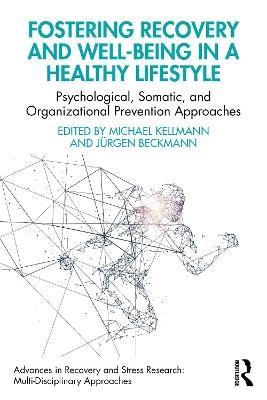
Fostering Recovery and Well-being in a Healthy Lifestyle
Routledge (Verlag)
978-1-032-15864-8 (ISBN)
Recognizing the systemic nature of stress and recovery is critical to designing effective interventions and policies. By promoting a balance between stress and recovery in physiological, psychological, and social terms, individuals and societies can build resilience, promote optimal well-being, and mitigate the negative effects of chronic stress. This book focuses on key research in the area of recovery and healthy living and addresses psychological, somatic and organizational prevention strategies that foster recovery and healthy lifestyles in society. It offers an expanded understanding of recovery in the health field and applies this to different areas, such as the workplace.
Though written for the scientific community, the book will also benefit applied health scientists, instructors, and students, as well as readers interested in applying effective well-being and recovery techniques in their own lives.
Michael Kellmann is Professor of Sport Psychology at the Faculty of Sport Science at Ruhr University Bochum, Germany. He is also an Honorary Professor in the School of Human Movement and Nutrition Sciences at the University of Queensland, Australia. Jürgen Beckmann is Professor of Sport Psychology, Emeritus of Excellence at the School of Medicine and Health at Technical University of Munich, Germany. He is currently member of the Psycho-Cardiological Consultation Group at the German Heart Centre Munich. He is also Honorary Professor in the School of Human Movement and Nutrition Sciences at the University of Queensland, Australia.
Part I: Conceptualizing the problem
1. Chronic illness and well-being: Promoting quality of life with a broadened concept of recovery
Jürgen Beckmann, Maximilian Huber, and Caroline S. Andonian-Dierks
2. Off-job and on-job recovery as predictors of employee health
Jan de Jonge and Toon W. Taris
3. Ambulatory Assessment for recovery and stress monitoring in the general population
Sarah Brüßler, Birte von Haaren-Mack, Anna Vogelsang, and Markus Reichert
Part II: Psychological prevention approaches
4. ‘Switch off when not in use’: The benefits of detachment from work and sport for recovery
Yannick A. Balk
5. Debriefing sport performance: A strategy to enhance mental and emotional recovery and plan for future competition
John M. Hogg
6. Engaging in creative behaviours and activities as a well-being and recovery approach
Veronique Richard, V. Vanessa Wergin, and John Cairney
7. "Use it right": The relationship between digital media and recovery
Jahan Heidari and Michael Kellmann
Part III: Somatic prevention approaches
8. Psychological relaxation techniques to enhance recovery in sports
Michael Kellmann, Maximilian Pelka, and Jürgen Beckmann
9. Yoga for recovery and well-being in athletes
Selenia di Fronso, Maurizio Bertollo, and Claudio Robazza
10. Sleep well! A key strategy beyond sports
Lisa Kullik and Asja Kiel
Part IV: Organizational prevention approaches
11. Optimising fatigue agility and recovery within military settings: Enhancing capability, well-being, and performance
Raymond W. Matthews, Gerard J. Fogarty, Eugene Aidman, and Tom Patrick
12. Building recovery into organizations to foster resilience
Joana Coelho Kuntz
13. Death due to overwork: Problems and solutions
Tomohide Kubo, Xinxin Liu, and Tomoaki Matsuo
14. Fostering recovery and well-being in a healthy lifestyle: A concluding summary
Jürgen Beckmann and Michael Kellmann
| Erscheinungsdatum | 27.02.2024 |
|---|---|
| Reihe/Serie | Advances in Recovery and Stress Research |
| Zusatzinfo | 5 Tables, black and white; 16 Line drawings, black and white; 16 Illustrations, black and white |
| Verlagsort | London |
| Sprache | englisch |
| Maße | 156 x 234 mm |
| Gewicht | 340 g |
| Themenwelt | Geisteswissenschaften ► Psychologie ► Allgemeine Psychologie |
| Medizin / Pharmazie ► Medizinische Fachgebiete ► Psychiatrie / Psychotherapie | |
| Studium ► Querschnittsbereiche ► Prävention / Gesundheitsförderung | |
| Wirtschaft ► Volkswirtschaftslehre | |
| ISBN-10 | 1-032-15864-6 / 1032158646 |
| ISBN-13 | 978-1-032-15864-8 / 9781032158648 |
| Zustand | Neuware |
| Informationen gemäß Produktsicherheitsverordnung (GPSR) | |
| Haben Sie eine Frage zum Produkt? |
aus dem Bereich


